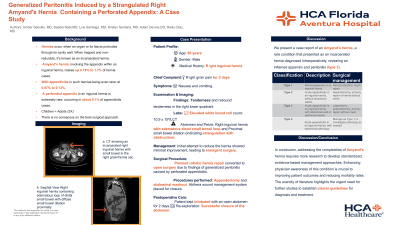Sunday Poster Session
Category: Small Intestine
P1578 - Generalized Peritonitis Induced by a Strangulated Right Amyand's Hernia Containing a Perforated Appendix: A Case Study
Sunday, October 27, 2024
3:30 PM - 7:00 PM ET
Location: Exhibit Hall E

Has Audio

Saadia Nabi, MD
Aventura Hospital
Aventura, FL
Presenting Author(s)
Ambar Sekulits, MD1, Saadia Nabi, MD2, Luis G. Santiago Zayas, MD2, Kristen Santana, MD2, Francini Alcocer, MD2, Sinay Ceballos, MD2, Adam Devine, DO2, Raiko Diaz, DO2
1Aventura Hospital, Dania Beach, FL; 2Aventura Hospital, Aventura, FL
Introduction: Hernias occur when an organ or its fascia protrudes through its cavity wall. When trapped and non-reducible, it's known as an incarcerated hernia. Amyand's hernia, involving the appendix within an inguinal hernia, makes up 0.19% to 1.7% of hernia cases, with appendicitis in such hernias being even rarer at 0.07% to 0.13%. A perforated appendix in an inguinal hernia is extremely rare, occurring in about 0.1% of appendicitis cases. Amyand’s hernia is three times more common in children than adults and is often diagnosed incidentally during surgery due to non-specific clinical signs and lack of definitive radiological features. There is no consensus on the best surgical approach. This case report describes a 90-year-old male with generalized peritonitis caused by a strangulated hernia containing a perforated appendix.
Case Description/Methods: A 90-year-old male with a history of a right inguinal hernia presented with a two-day history of right groin pain, nausea, and vomiting. Examination revealed tenderness and rebound tenderness in the right lower quadrant. His white blood cell count was elevated at 10.9. A CT scan showed a right inguinal hernia with an edematous loop of the distal small bowel and proximal small bowel dilation, indicating a strangulated hernia with obstruction. Attempts to reduce the hernia improved symptoms slightly but it remained irreducible, with worsening abdominal pain. He was scheduled for an emergent robotic hernia repair, which was converted to an open procedure. Surgery revealed generalized peritonitis caused by perforated appendicitis within the strangulated hernia. An appendectomy, abdominal washout, and Abthera wound management system placement were performed. The operation was successful, leaving him intubated with an open abdomen. Two days later, a re-exploration successfully closed his abdomen.
Discussion: To improve outcomes and reduce mortality rates for Amyand's hernia and incarcerated appendixes within hernias, physicians need to become more familiar with these conditions. The limited literature makes self-education challenging, so further studies are necessary for better diagnosis and management guidance. Raising awareness, conducting more research, and fostering collaboration among healthcare providers are crucial for enhancing the care and prognosis of these conditions.
Disclosures:
Ambar Sekulits, MD1, Saadia Nabi, MD2, Luis G. Santiago Zayas, MD2, Kristen Santana, MD2, Francini Alcocer, MD2, Sinay Ceballos, MD2, Adam Devine, DO2, Raiko Diaz, DO2. P1578 - Generalized Peritonitis Induced by a Strangulated Right Amyand's Hernia Containing a Perforated Appendix: A Case Study, ACG 2024 Annual Scientific Meeting Abstracts. Philadelphia, PA: American College of Gastroenterology.
1Aventura Hospital, Dania Beach, FL; 2Aventura Hospital, Aventura, FL
Introduction: Hernias occur when an organ or its fascia protrudes through its cavity wall. When trapped and non-reducible, it's known as an incarcerated hernia. Amyand's hernia, involving the appendix within an inguinal hernia, makes up 0.19% to 1.7% of hernia cases, with appendicitis in such hernias being even rarer at 0.07% to 0.13%. A perforated appendix in an inguinal hernia is extremely rare, occurring in about 0.1% of appendicitis cases. Amyand’s hernia is three times more common in children than adults and is often diagnosed incidentally during surgery due to non-specific clinical signs and lack of definitive radiological features. There is no consensus on the best surgical approach. This case report describes a 90-year-old male with generalized peritonitis caused by a strangulated hernia containing a perforated appendix.
Case Description/Methods: A 90-year-old male with a history of a right inguinal hernia presented with a two-day history of right groin pain, nausea, and vomiting. Examination revealed tenderness and rebound tenderness in the right lower quadrant. His white blood cell count was elevated at 10.9. A CT scan showed a right inguinal hernia with an edematous loop of the distal small bowel and proximal small bowel dilation, indicating a strangulated hernia with obstruction. Attempts to reduce the hernia improved symptoms slightly but it remained irreducible, with worsening abdominal pain. He was scheduled for an emergent robotic hernia repair, which was converted to an open procedure. Surgery revealed generalized peritonitis caused by perforated appendicitis within the strangulated hernia. An appendectomy, abdominal washout, and Abthera wound management system placement were performed. The operation was successful, leaving him intubated with an open abdomen. Two days later, a re-exploration successfully closed his abdomen.
Discussion: To improve outcomes and reduce mortality rates for Amyand's hernia and incarcerated appendixes within hernias, physicians need to become more familiar with these conditions. The limited literature makes self-education challenging, so further studies are necessary for better diagnosis and management guidance. Raising awareness, conducting more research, and fostering collaboration among healthcare providers are crucial for enhancing the care and prognosis of these conditions.
Disclosures:
Ambar Sekulits indicated no relevant financial relationships.
Saadia Nabi indicated no relevant financial relationships.
Luis Santiago Zayas indicated no relevant financial relationships.
Kristen Santana indicated no relevant financial relationships.
Francini Alcocer indicated no relevant financial relationships.
Sinay Ceballos indicated no relevant financial relationships.
Adam Devine indicated no relevant financial relationships.
Raiko Diaz indicated no relevant financial relationships.
Ambar Sekulits, MD1, Saadia Nabi, MD2, Luis G. Santiago Zayas, MD2, Kristen Santana, MD2, Francini Alcocer, MD2, Sinay Ceballos, MD2, Adam Devine, DO2, Raiko Diaz, DO2. P1578 - Generalized Peritonitis Induced by a Strangulated Right Amyand's Hernia Containing a Perforated Appendix: A Case Study, ACG 2024 Annual Scientific Meeting Abstracts. Philadelphia, PA: American College of Gastroenterology.
